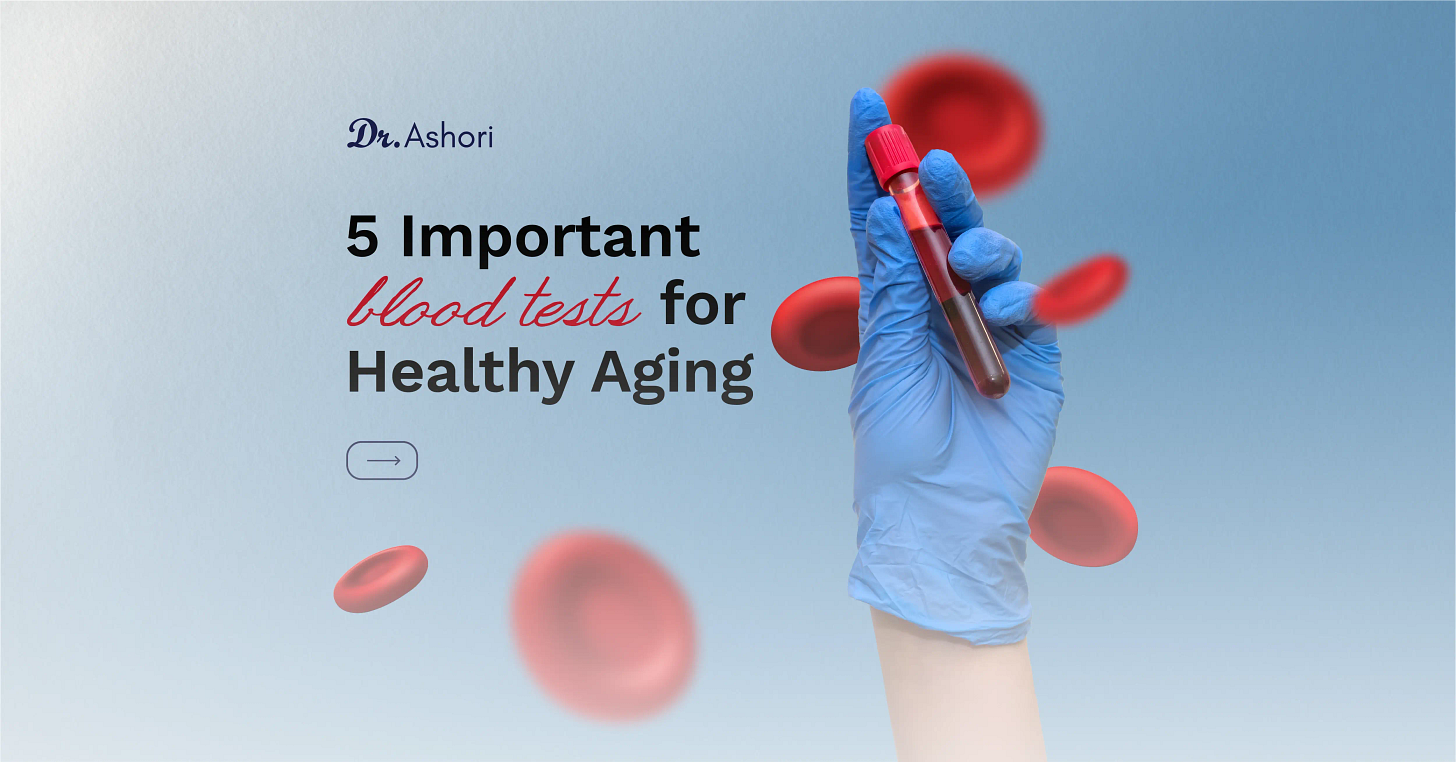My Top 5 Blood Tests for Healthy Aging
These are the main blood tests I recommend my patients know about as they round their 30s or 40s. Bad results just mean that there is room for improvement.
UPDATED: July 25th, 2025
Welcome to the Healthy Aging Newsletter, a free publication translating trustworthy medical research into simple habits to age well, free of chronic disease. I’m Dr. Ashori, a family medicine doctor turned health coach.
Healthy aging starts with understanding your body’s unique quirks. And while blood tests can offer some clues, there’s no universal “checklist” that fits everyone. By no means is this list exhaustive but it’s a good conversation starter between me and my patients.
Your age, genetics, lifestyle, health goals, and even your worries about the future all shape what tests are worth doing. But in countries like the US, where heart disease, cancer, diabetes, obesity, and cognitive decline top the list of concerns, some labs are more important, especially when you’re in your 30s and 40s.
Here are 5 blood tests that I often discuss with my patients and health coaching clients. I always view them as a signal for risk, and we then discuss what to do about them based on how my patient defines ‘health’.
1. ApoB - Cardiovascular Risk
Unlike LDL-C, ApoB gives you a direct count of the particles that can lead to plaque buildup. It's especially helpful if you have a family history of heart disease or if your cholesterol panel looks “normal” but something still feels off.
It’s cheap and readily available. I use Rupa Health or LabCorp to order this for my patients.
2. hs-CRP
Inflammation plays a role in almost every age-related disease, heart attacks, stroke, Alzheimer’s dementia, arthritis, even cancer. A high-sensitivity CRP can detect low-grade, chronic inflammation before symptoms show up. If it's elevated, it doesn’t mean something’s wrong, but it does mean it’s time to dig deeper.
There are other biomarkers for inflammation, such as ESR. And, never disregard your symptoms of inflammation, from fatigue to acne, to bloating, or joint pains.
3. Fasting Insulin
Insulin resistance can develop silently and gradually, often years before blood sugar or A1C rises. The fasting insulin blood test can show whether your cells are still responding well to insulin, or whether your body is starting to struggle. It’s one of the best early predictors of metabolic health and long-term energy. But there are other ways to ‘guess’ your insulin resistance.
A good alternative is a 30-minute, 1-hour, and 2-hour fingerstick with a store-bought handheld glucometer, measured after a large high-carb meal. For those with minimal insulin resistance, their blood sugar shouldn’t fluctuate too much even with high-sugar intake.
4. Hemoglobin A1C
While not perfect, A1C gives a 3-month average of your blood sugar. It’s a common test for diabetes screening, but also helpful for tracking how diet, stress, and sleep are affecting your metabolism over time. I find it to be a poor diagnostic tool but a great tracking tool.
5. Uric Acid
Often overlooked, uric acid levels can reveal a lot about your risk for metabolic dysfunction, gout, and even kidney health. Elevated levels can show up long before symptoms. It’s not a test for everyone, but in the context of fatigue, hypertension, or excess belly fat, it can be a piece of the puzzle.
Bonus: A DEXA Scan
While not a blood test, I often recommend a DEXA scan as a one-time baseline for certain body compositions. It checks both your bone density and body composition: muscle vs. fat. It’s a great way to track the kind of weight you’re gaining or losing, especially as hormones shift with age.
Final Thoughts
There’s no perfect list. What matters is that your labs reflect your priorities, not just your risks, but your health goals too. Do you want more energy? Sharper memory? Stronger bones? Fewer pills in your 60s?
Healthy aging is about prioritizing the interventions that you can realistically stick to, to get the health results you’re after now, and a couple of decades in the future.
If you’re not sure where to start, I’d love to help you design a plan that makes sense for you. Find out more at DrAshori.com.



